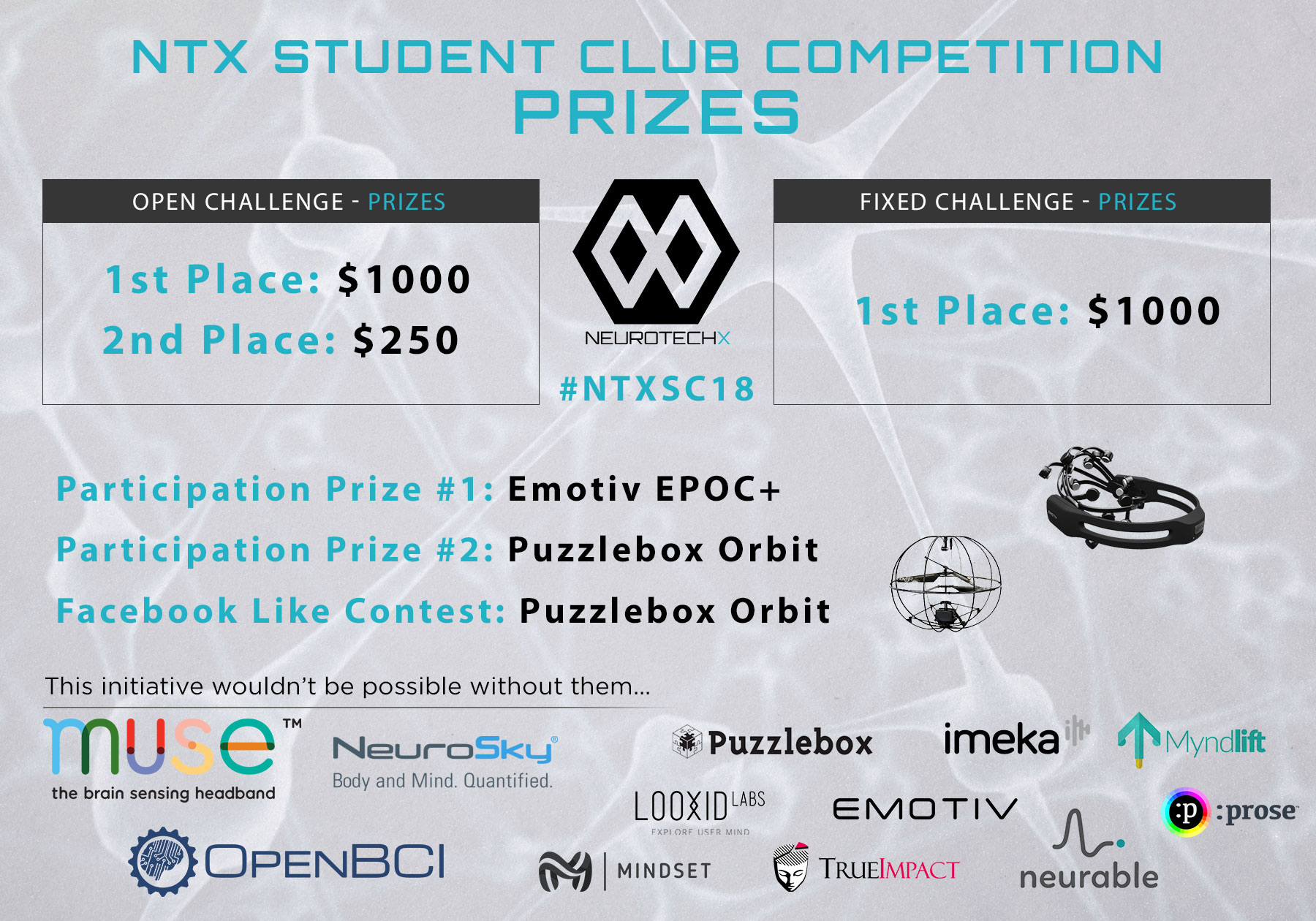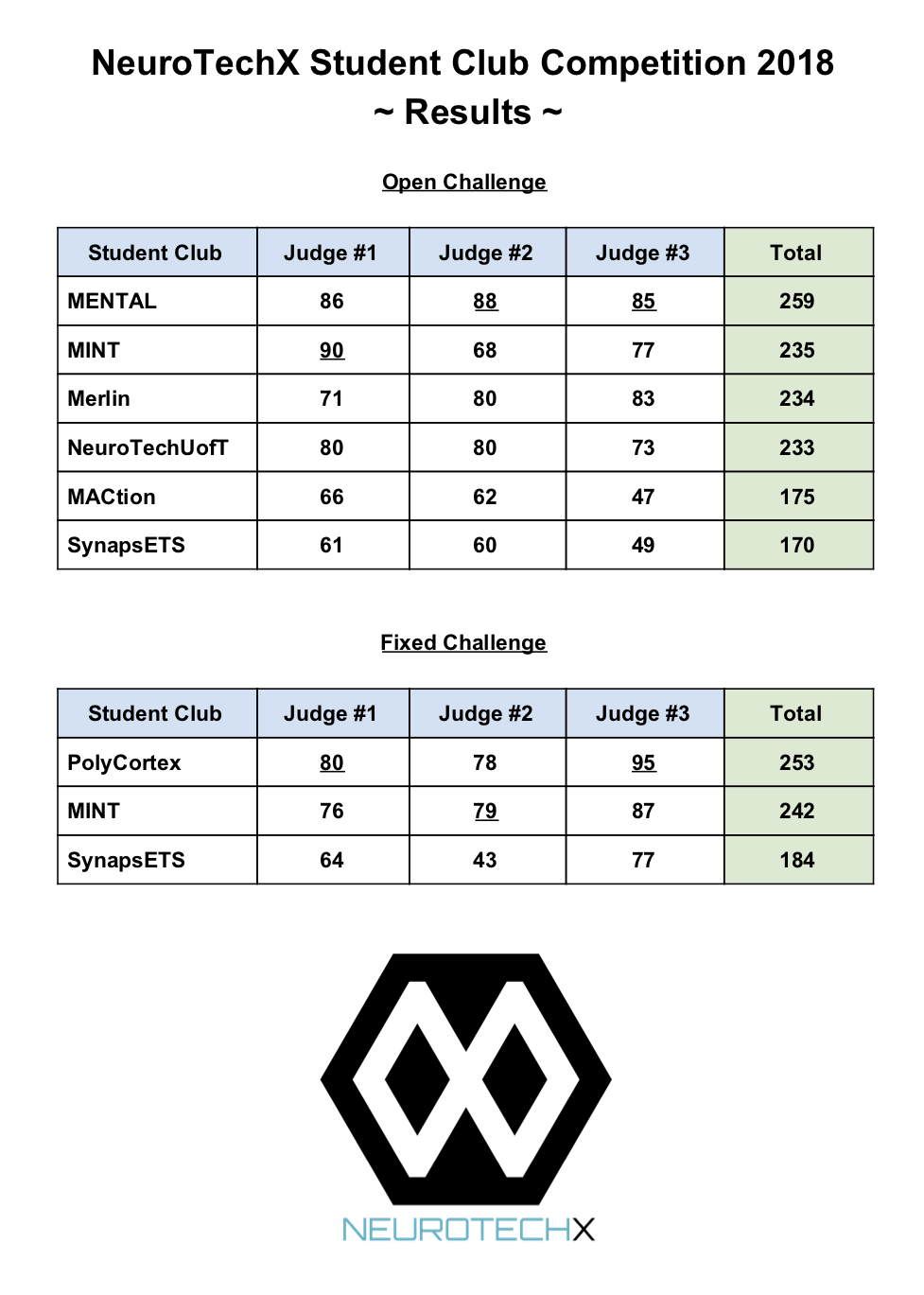NeuroTechX Student Clubs Competition 2018
Here are the winners of the 2018 NeuroTechX Student Club Competition.
- Open Challenge 1st place: MENTAL, McGill University
- Open Challenge 2nd place: MINT, UBC
- Fixed Challenge 1st place: PolyCortex, Polytechnique Montreal
- Facebook Like Contest: PolyCortex, Polytechnique Montreal
- Participation Prize #1 (Emotiv EPOC+): NeurotechUofT, UofT
- Participation Prize #2 (Puzzlebox): MACtion Potential, McMaster
Links to their amazing projects
- MENTAL: https://youtu.be/Ytnn0dv_0To
- MINT: https://youtu.be/fId6-cbF0wI
- PolyCortex: https://youtu.be/atC3hWOa5uw
All projects: http://bit.ly/NTXSC18
Thanks to our awesome jury for taking their time to evaluate the projects and give valuable feedback to the students! Dr. Emily Mugler, Dr. Chris Crawford, Dr. Camille Jeunet, Morgan Hough, Dr. Alexandre Barachant and Dr. Christoph Guger.
Thanks also to our sponsors without whom this initiative wouldn't be possible. Muse, OpenBCI, NeuroSky, Puzzlebox, Neurable, Mindset, Looxid Labs,EMOTIV, True Impact, Imeka, Cognixion & Myndlift.
And last but not least, congratulations to all participating student clubs!


The NeuroTechX SC Online Competition has two components: a fixed challenge and an open challenge.
All team must submit a 10-min video including a presentation and a demonstration of the project, for both challenges. All team must also provide a public GitHub repository, including the project components and a comprehensive description with all the steps to reproduce it. The deadline for submitting a project to any of the two challenges is Sunday, March 18th, 2018 at 23:59. All projects must be reproducible and open-source.
Participation rules
- The team must be composed of at least three (3) undergraduate students from the same university (or campus). Make sure you can use your university name.
- The team must have a web page with a team name & administrators (point of contact).
Open challenge
The open challenge aims at increasing the overall creativity of neurotech students. All projects related to neurotechnologies are allowed. Specific rules are listed hereafter:
- The project has to be related to neurotechnology, but there is no restriction on the type of project, it could be an art project, a game, a medical solution, etc.
Here is a non-exhaustive list of neuro-tech-related fields:- Your body is the input: EEG, ECG, EMG, EOG, GSR, temperature, blood pressure, etc.
- Cognitive neuroscience
- Computational neuroscience
- Neuroimaging
- etc.
- A prototype is mandatory.
- A proposal of the project should be submitted and approved at least 2 month prior.
- While re-doing existing projects is valuable, something ‘novel’ is expected. #NeuroInnovation
Replicating existing technologies is allowed and will not be undervalued.
A EEG dataset is suggested for software and EEG-oriented project but not mandatory.
Fixed challenge
The fixed challenge aims at increasing the general knowledge of neurotech students by challenging them to build a fully home-made acquisition pipeline for EEG signals, including the following five stages (stages 2 and 3 can be switched depending on stage 1), with variable constraints from year to year.
Each stage has specific objectives (italic items is required):
- Acquisition
- Develop an home-made acquisition board, with at least 1 channel
- Total cost of board must not exceed 1000 USD (excluding R&D)
- Signal processing
- Focus on signal of interest (EEG) and remove artifacts and noise
- Data transmission
- Data must be acquired with a speed of at least 200 Hz
- Transmitted to a distant computer wirelessly or not
- Real-time visualization
- Real-time visualization of signal in the time and frequency domains, for each acquisition channel
- An “alpha mode” must enable the easy characterization of the alpha band power, following a open/close paradigm
- Data recording
- Data must be stored on a computer with appropriate data format for latter use
2018 constraints
- Acquisition of EEG signal is recommended (pipeline could be presented with EMG or ECG).
- Acquisition chips such as ADS1299 are accepted.
- PCB are highly recommended (not mandatory).
- Open-source libraries for data transmission and visualization are allowed, full package such as OpenVibe are not allowed.